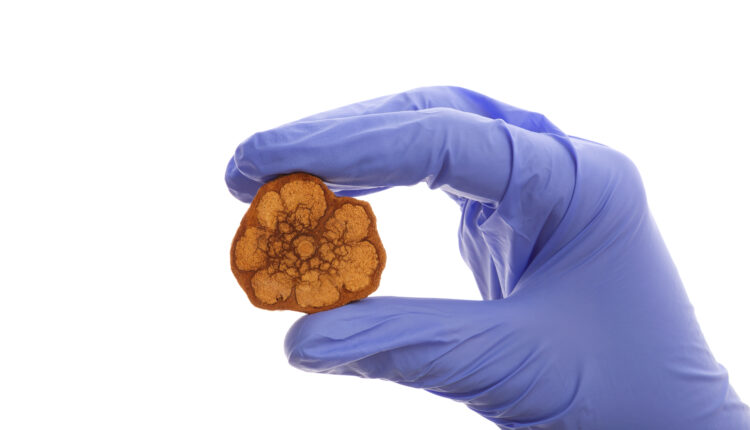
Small Pharma DMT Therapeutics Nearing 2nd Round Of Clinical Trials
N-Dimethyltryptamine, or DMT, has experienced a recent surge in popularity in mental health and wellness communities. The naturally occurring psychedelic’s ties to shamanic practices and its association with Amazonian spiritual retreats has created a mythical allure and one that often includes both a physical and spiritual journey.
Small Pharma, the London-based psychedelic treatment firm, is working to substantiate the mental health benefits of N-Dimethyltryptamine, proving that the driving forces behind the Ayahuasca retreat fad are in fact on to something.
With clinical trials currently underway, Small Pharma is the first psychedelic firm to test the DMT compound on subjects to fully understand its impact on the human brain. These trials hope to establish a connection between N-Dimethyltryptamine and depression.
Valued at CAD $145.7 million on the Toronto exchange, Small Pharma has broken the mold of other European psychedelic firms in that the group has managed to secure large investments from North American investors.
Psychedelic firms Awakn and Compass Pathways similarly looked across the pond for financial assistance, and while the UK offers an ideal setting for brands looking to further expand the possibilities in the space, a greater potential for growth capital likely lies in the Americas.
What distinguishes Small Pharma from the aforementioned psychedelic companies is their emphasis on DMT as opposed to psilocybin. While both chemical compounds produce psychoactive effects, the duration of DMT’s effect is typically much shorter.
The shorter duration is extremely advantageous from a medicinal perspective, as the experience is much more controlled as opposed to the 6+ hour psychoactive trip often associated with higher doses of psilocybin.
N-Dimethyltryptamine can be used for smaller 1-hour therapeutic sessions, meaning patients could more easily work the psychedelic into their daily lives. Pre-session work would take place to prepare the patient mentally for the “experience” and practitioners would eventually be able to determine the proper dosages needed for each patient/situation.
Small Pharma’s N-Dimethyltryptamine trials began at the start of the year, and the team is aiming to offer the DMT product as a licensed therapeutic product within six years.
Sitting at the top of the DMT space was never the plan, though, as Small Pharma first set out to cure and treat depression through natural therapeutics. With an estimated 1 in 6 people expected to suffer from some form of depression, Small Pharma established their desired solution before deciding on how they would get there.
CEO Peter Rands and his team quickly identified psychedelics as the most likely candidate in their quest.
“The science was moving forward and we were discovering new things about known compounds we didn’t know before, and I thought that was the perfect environment we could operate in.”
Extensive research was conducted with both ketamine and psilocybin, but efforts to limit the psychedelic properties of these compounds had proven difficult for competitors. Rands also noticed that these failed efforts had left psychedelic firms unable to obtain clearance for clinical trials.
‘I thought, everyone is failing where we are trying to treat,” Rands shared with MailOnline. “So we looked at whether the psychedelic experience could be a marker of efficacy rather than a marker to dial down.”
This is where Small Pharma decided to focus on DMT, a psychedelic that is both faster to deliver and one that can pass through a patient’s system in less than an hour. In essence, the drug therapy could take place within the same duration of your traditional therapy session.
COVID-19’s impact has pushed mental health to the forefront of many political and medical conversations, and the climate has never been more ripe for the advancement and acceptance of alternative treatments for those suffering from mental health concerns.
The increased awareness of mental health concerns combined with Small Pharma’s trailblazing research into DMT as a combatant has seen the firm’s ability to raise funds increase significantly.
Where Small Pharma had only raised around CAD $10 million in their early years, the group has now raised CAN $63 million this year alone. This sudden influx of funds helped kickstart the current run of clinical trials, and also to lay the groundwork for upcoming rounds that hope to further understand DMT’s true potential as a therapeutic.
With the first trials scheduled to conclude later this summer, Small Pharma expects to see the second stage start shortly after and conclude sometime in the first half of 2022.
While the expectations of a marketable product first hitting the shelves in six years sounds somewhat intimidating to investors, Small Pharma’s decision to rely on DMT as the psychoactive ingredient could see them sidestep many dosage and potency issues that competitors in the space are likely to encounter with psilocybin and ketamine.



